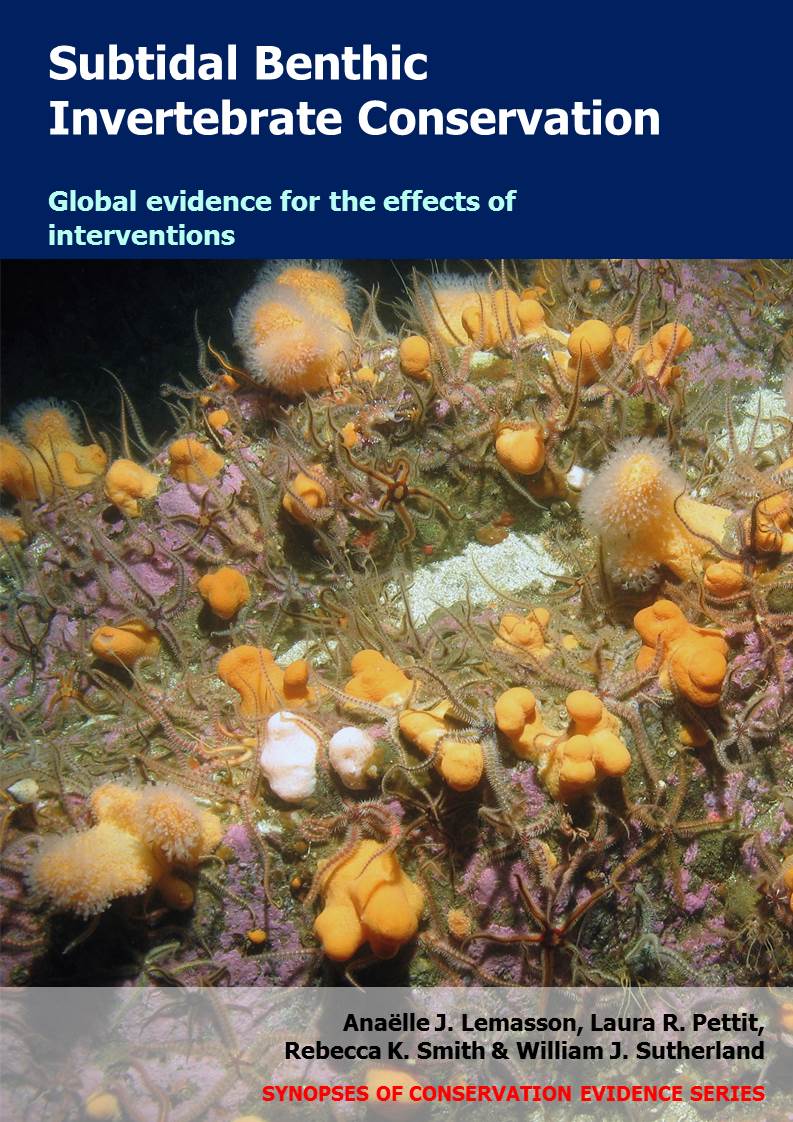Actions to conserve biodiversity
We have summarised evidence from the scientific literature about the effects of actions to conserve wildlife and ecosystems.
Review the evidence from the studies
Not sure what Actions are? Read a brief description.
Search for evidence
e.g. "frogs chytrid"
226 Actions found
Refine
Hide
226 Actions found
Download Actions
| 0 selected |
|
Order results by:
| Action | Effectiveness | Studies | Category | |
|---|---|---|---|---|
|
Limit the amount of storm wastewater overflow Action Link |
No evidence found (no assessment) | 0 |
|
|
|
Use double hulls to prevent oil spills Action Link |
No evidence found (no assessment) | 0 |
|
|
|
Remove or clean-up oil pollution following a spill Action Link |
Unknown effectiveness (limited evidence) | 1 |
|
|
|
Set regulatory ban on marine burial of nuclear waste Action Link |
No evidence found (no assessment) | 0 |
|
|
|
Cease or prohibit aquaculture activity Action Link |
Unknown effectiveness (limited evidence) | 2 |
|
|
|
Reduce aquaculture stocking densities Action Link |
No evidence found (no assessment) | 0 |
|
|
|
Locate aquaculture systems in already impacted areas Action Link |
No evidence found (no assessment) | 0 |
|
|
|
Locate aquaculture systems in areas with fast currents Action Link |
No evidence found (no assessment) | 0 |
|
|
|
Locate aquaculture systems in vegetated areas Action Link |
No evidence found (no assessment) | 0 |
|
|
|
Moor aquaculture cages so they move in response to changing current direction Action Link |
No evidence found (no assessment) | 0 |
|
|
|
Leave a fallow period during fish/shellfish farming Action Link |
Unknown effectiveness (limited evidence) | 3 |
|
|
|
Improve fish food and pellets to reduce aquaculture waste production Action Link |
No evidence found (no assessment) | 0 |
|
|
|
Reduce the amount of pesticides used in aquaculture systems Action Link |
No evidence found (no assessment) | 0 |
|
|
|
Reduce the amount of antibiotics used in aquaculture systems Action Link |
No evidence found (no assessment) | 0 |
|
|
|
Use species from more than one level of a food web in aquaculture systems Action Link |
No evidence found (no assessment) | 0 |
|
|
|
Locate artificial reefs near aquaculture systems (and vice versa) to act as biofilters Action Link |
No evidence found (no assessment) | 0 |
|
|
|
Use other bioremediation methods in aquaculture Action Link |
No evidence found (no assessment) | 0 |
|
|
|
Regulate the use, dosage and disposal of agrichemicals Action Link |
No evidence found (no assessment) | 0 |
|
|
|
Treat wastewater from intensive livestock holdings Action Link |
No evidence found (no assessment) | 0 |
|
|
|
Establish aquaculture to extract the nutrients from run-offs Action Link |
No evidence found (no assessment) | 0 |
|
|
|
Create artificial wetlands to reduce the amount of pollutants reaching the sea Action Link |
No evidence found (no assessment) | 0 |
|
|
|
Limit, cease or prohibit discharge of solid waste overboard from vessels Action Link |
No evidence found (no assessment) | 0 |
|
|
|
Install stormwater traps or grids Action Link |
No evidence found (no assessment) | 0 |
|
|
|
Remove litter from the marine environment Action Link |
No evidence found (no assessment) | 0 |
|
|
|
Use biodegradable panels in fishing pots Action Link |
No evidence found (no assessment) | 0 |
|
Download Actions
| 0 selected |
|

Subtidal Benthic Invertebrate Conservation - Published 2020
Watch this search
If you are familiar with RSS feeds, please click the button below to retrieve the feed URL:
RSS feed for this searchIf you are unfamiliar with RSS feeds, we would suggest reading this BBC article.
Unfortunately, due to the number of feeds we have available, we cannot provide e-mail updates. However, you could use tools such as Feed My Inbox to do this for you.
What are 'Individual studies' and 'Actions'?
Individual studies
An individual study is a summary of a specific scientific study, usually taken from a scientific journal, but also from other resources such as reports. It tells you the background context, the action(s) taken and their consequences.
If you want more detail please look at the original reference.
Actions
Each action page focuses on a particular action you could take to benefit wildlife or ecosystems.
It contains brief (150-200 word) descriptions of relevant studies (context, action(s) taken and their consequences) and one or more key messages.
Key messages show the extent and main conclusions of the available evidence. Using links within key messages, you can look at the paragraphs describing each study to get more detail. Each paragraph allows you to assess the quality of the evidence and how relevant it is to your situation.
Where we found no evidence, we have been unable to assess whether or not an intervention is effective or has any harmful impacts.





)_2023.JPG)














